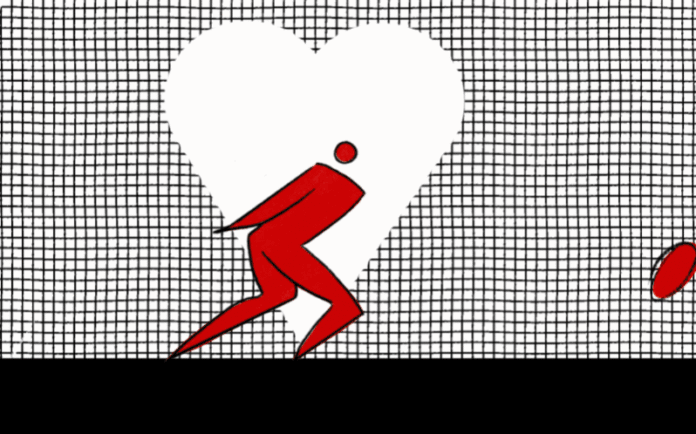Alice Martin, The Concordian
MONTREAL (CUP) — Volley Boréal is one of the many LGBTQ+ leagues aiming to provide a discrimination-free space.
Every Monday, the players at Volley Boréal gather at Collège de Maisonneuve for their weekly game night, a tradition that has been alive since its foundation in 2004.
Volley Boréal is a not-for-profit mixed-gender LGBTQ+ volleyball club. It was created following the fusion of two gay volleyball clubs that existed in the ’80s and served different purposes: competition and socialization.
It encompasses 12 recreational teams and 12 semi-competitive teams with a total of around 200 members.
“A lot of players have a need to come socialize in a safe place, to play without any fear of discrimination, and to be themselves,” said Karl Côté, president of Volley Boréal.
Côté joined the league in 2008 when he was looking to connect with the LGBTQ+ community while staying physically active. He found the league through a friend — like most players do — and was immediately welcomed, even though he had never played volleyball before.
Warm welcomes and inclusivity are what Volley Boréal thrives on, according to Côté. Their website emphasizes that “any form of discrimination based on sex, age, ethnicity or sexual orientation is prohibited.”
Volley Boréal is an extremely diverse club, which is immediately noticeable during their weekly games.
“We meet people of all types of backgrounds,” said Mia Beaudoin-Dion, a transwoman who has played with them for two years now. “It isn’t reserved at all to queer people, we have a lot of heterosexual people, allies, that join us.”
When Beaudoin-Dion joined the league, she had just started her transition.
“I was looking for safe spaces in my life that would accept me for who I was,” she said.
“I felt no judgment from the other players, unlike with family and friends, where it was more difficult. The volleyball club made me feel better because it wasn’t a big deal. My transition was just accepted and normalized.”
Jean Gilbert, another member, has been with the club for 16 years, as long as he’s been in Montréal. He saw the recreational league grow from six to 12 teams and he witnessed more women starting to participate.
It was important for him to be a part of an LGBTQ+ group, but as a 66-year-old man working from home, there was more to it.
“I don’t necessarily see a lot of people,” he said.
“By coming here, I can meet people, I’ve made friends. It’s important for me to have a space that can break my isolation and make a change from being at home.”
The need to socialize is also the main reason Sébastien Shah, now vice-president of Volley Boréal, first joined as a member back in 2019.
Even though Shah didn’t join the team with no intention to find a partner, he ended up meeting his current boyfriend of three years.
Since then, he’s had the club engraved in his heart and that’s why he decided to join the board of directors: to give back to them like they had given to him. It isn’t even conceivable for him to leave the club.
“I have four classes at university, I’m preparing for internships, my head is barely above the water and everyone around tells me to cut somewhere, to cut in volleyball,” Shah said.
But for him, the volleyball club is a way to decompress from his busy life and to cope with mental health. Being on the board of directors might be demanding for Shah, but it’s fun and gratifying.
It gives him his energy for the week, and he counts the days before each Monday.
Shah emulates the feeling of most — if not all — of Volley Boréal’s players. There is an unequivocal and contagious joie de vivre in the gym when they play. Volley Boréal is the proof that inclusivity and sports make for a match made in heaven.
This article was shared via the CUP Wire, maintained by the Canadian University Press.

